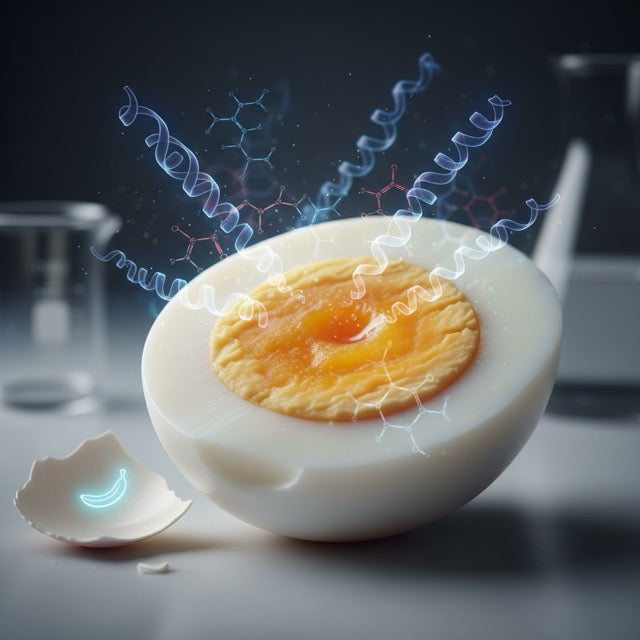
Eggs as a Functional Food for Dogs and Cats: Science-Backed Benefits, Safety, and Feeding Guidelines
Share
Are Eggs Good for Dogs and Cats? A Vet-Approved Guide

Eggs have long been considered a nutritional powerhouse, not just for humans but also for companion animals. When sourced safely and prepared properly, eggs offer a balanced combination of high-quality protein, essential fatty acids, and key micronutrients that can complement a complete canine or feline diet. This article reviews the scientific basis for feeding eggs to dogs and cats, discusses digestibility and safety considerations, and provides practical feeding guidelines rooted in veterinary nutrition principles.
Nutritional Profile and Key Health Benefits
1. High-Quality, Highly Digestible Protein
Eggs are among the most complete sources of animal protein. They contain all essential amino acids required by dogs and cats in the right proportions for tissue growth, repair, and maintenance.
- Protein quality in eggs is often used as a reference standard (biological value = 100).
- Research has shown true protein digestibility exceeding 90% for cooked eggs in both dogs and cats (Case et al., Canine and Feline Nutrition, 3rd ed., 2011).
- This makes eggs an ideal supplementary protein for animals with increased metabolic needs or those recovering from illness.
2. Skin, Coat, and Immune Support
Egg yolks are rich in essential fatty acids (linoleic acid and arachidonic acid), which play a critical role in maintaining healthy skin and a glossy coat.
- The vitamin A, D, E, and biotin content also supports epithelial integrity and immune function.
- In cats, choline and arginine from eggs contribute to hepatic and neurological health (Fascetti & Delaney, Applied Veterinary Clinical Nutrition, 2012).
3. Micronutrient Density
Eggs supply a range of vitamins and minerals that are often underrepresented in commercial diets:
- B vitamins (riboflavin, cobalamin, niacin) support metabolism and red blood cell formation.
- Selenium and iron function as antioxidants and oxygen carriers.
- Phosphorus supports skeletal and cellular health.
Raw vs. Cooked: Safety and Digestibility

Feeding raw eggs is a debated topic in companion animal nutrition. While raw feeding enthusiasts often argue for “natural” diets, scientific evidence overwhelmingly supports cooking as the safer and more digestible option.
1. Pathogen Elimination
Cooking eggs effectively destroys Salmonella spp. and other pathogens that pose risks to both pets and humans (FDA, Center for Veterinary Medicine). Dogs and cats can act as carriers, shedding bacteria even without clinical illness.
2. Inactivation of Antinutritional Factors
Raw egg whites contain avidin, a protein that binds tightly to biotin (vitamin B7) and prevents its absorption. Chronic ingestion of raw egg whites can therefore lead to biotin deficiency, manifesting as dermatitis, alopecia, and poor growth. Cooking denatures avidin, preserving biotin availability and improving overall nutrient absorption (Tufts Clinical Nutrition Service, 2021).
3. Digestibility and Bioavailability
Cooking not only ensures safety but also increases true nutrient digestibility by denaturing proteins and antinutrients, making amino acids more accessible.
- Cooked eggs (boiled, poached, or scrambled without added fat or salt) maintain digestibility values above 90–95%, comparable to premium commercial diets (Case et al., 2011).
- In contrast, raw eggs have slightly reduced digestibility due to intact antinutritional factors.
Feeding Guidelines and Practical Considerations

Moderation is key—eggs should enhance, not replace, a complete and balanced diet.
| Pet Type | Typical Serving Frequency | Portion Size | Notes |
|---|---|---|---|
| Medium Dog (15–20 kg) | 2–3 times weekly | 1 cooked egg | Adjust for total caloric intake |
| Small Dog / Cat | 2–3 times weekly | ⅓–½ cooked egg | Ensure gradual introduction |
| Puppies / Kittens | Consult a veterinarian | — | Consider growth-specific needs |
Calories: One large egg provides ~70 kcal. Keep total treats (including eggs) under 10% of daily caloric intake (AAFCO Feeding Guidelines).
Preparation: Boiled or lightly scrambled without oil, butter, salt, or seasoning.
Allergies: Rare but possible; introduce new foods gradually and monitor for adverse reactions.
Special diets: Pets with pancreatitis, obesity, or specific protein restrictions should only receive eggs under veterinary supervision.

Scientific Consensus and Take-Home Message
Cooked eggs are superior to raw eggs in terms of safety, digestibility, and nutrient utilization.
They are an excellent supplemental protein source, rich in essential nutrients that support skin, coat, and metabolic health.
Eggs are not a “complete food” and should complement a balanced commercial or home-prepared diet designed under veterinary guidance.
With appropriate preparation and portion control, eggs can be a valuable and enjoyable addition to your dog or cat’s nutrition plan.
Ready to Give Your Pet the Best?
At Furry Green, we follow veterinary nutrition principles. That's why we add perfectly cooked, digestible egg to every single bag of our fresh pet food, ensuring a complete and balanced meal.
Shop Our Vet-Nutritionists Formulated MealsFrequently Asked Questions
No, it is not recommended. Cooking eggs is the safest option as it eliminates harmful pathogens like Salmonella. It also deactivates avidin, a protein in raw egg whites that can cause biotin deficiency, and improves overall nutrient digestibility.
Moderation is key. A medium-sized dog can have one cooked egg 2-3 times a week, while a small dog or cat can have ⅓ to ½ of a cooked egg for the same frequency. Always ensure that treats, including eggs, make up less than 10% of your pet's total daily caloric intake.
Eggshells are a source of calcium, but they must be properly prepared (cleaned and ground into a fine powder) to be safe and digestible. It is generally safer and more effective to rely on a complete and balanced diet for your pet's calcium needs. Consult your veterinarian before adding eggshells to your pet's food.
References
Case, L. P., Daristotle, L., Hayek, M. G., & Raasch, M. F. (2011). Canine and Feline Nutrition: A Resource for Companion Animal Professionals (3rd ed.). Mosby Elsevier.
Fascetti, A. J., & Delaney, S. J. (2012). Applied Veterinary Clinical Nutrition. Wiley-Blackwell.
Tufts University Clinical Nutrition Service. (2021). “Can Dogs and Cats Eat Eggs?” Petfoodology.
American Kennel Club (AKC). “Can Dogs Eat Eggs? Are Eggs Good for Dogs?” (2022).
U.S. Food and Drug Administration (FDA) Center for Veterinary Medicine. “Salmonella in Pet Food and Treats.”
Association of American Feed Control Officials (AAFCO). Dog and Cat Food Nutrient Profiles.
